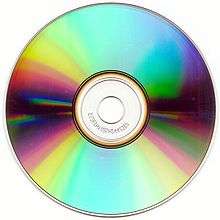shovelware
English
WOTD – 25 February 2017

Shovelware (sense 1) is a haphazard collection of software assembled in terms of quantity rather than quality, often on a storage medium such as the CD-ROM pictured above
Pronunciation
- (Received Pronunciation) IPA(key): /ˈʃʌvəlwɛə(ɹ)/
- (General American) IPA(key): /ˈʃʌvəlwɛɚ/
- Hyphenation: sho‧vel‧ware
Noun
shovelware (uncountable)
- (computing, slang, derogatory) A haphazard collection of software assembled in terms of quantity rather than quality. [from 20th c.]
- 1997, Robert H. Reid, Architects of the Web: 1,000 Days that Built the Future of Business, New York, N.Y.: Wiley], →ISBN, page 86:
- Internet vanity broadcasts may be nice for station owner egos or 'WKRP' wannabes without a real transmission tower … But this is essentially audio shovelware, no better than dumping videos or books without interactive elements onto a CD-ROM or the Net.
- 2007, Joseph T. Sinclair, “Choosing Auction Management Software”, in eBay the Smart Way: Selling, Buying, and Profiting on the Web's #1 Auction Site, 5th edition, New York, N.Y.: American Management Association, →ISBN, pages 339 and 340:
- If you're going to buy eBay software, buy eBay software. That is, don't buy a CD with everything else in the world on it. CDs with everything in the world on them are known in the industry as shovelware. […] Anything offered as part of a shovelware package is suspect. If the eBay software seems to get lost in the hyped benefits of the shovelware package, it's probably not worth much.
-
- (media, slang) Traditional media content, such as printed news reports, republished hastily on the Internet without considering the needs and capabilities of that medium.
- 1998 December 7, Mark Deuze, “The WebCommunicators: Issues in Research into Online Journalism and Journalists”, in First Monday: Peer-reviewed Journal on the Internet, volume 3, number 12, Chicago, Ill.: University Library, University of Chicago, ISSN 1396-0466, OCLC 782327442, archived from the original on 22 February 2017:
- The importance given to ‘original content’ for instance comes from the general notion that the online newscast is a new medium and therefore requires original content instead of supplying the user with mere copies of its print version (‘shovelware’). Though this may be a valid opinion, the underlying assumption – online newsmedia are just an arm of their respective print, television or radio bodies – can be criticized.
- 2005, Bob Franklin; Martin Hamer; Mark Hanna; Marie Kinsey; John E. Richardson, “Shovelware”, in Key Concepts in Journalism Studies, London: SAGE Publications, →ISBN, page 243:
- Perceived by some as a disparaging term, it is used to describe content moved wholesale from one communication medium to another with little or no alteration or adaptation for style, appearance or usability purposes. An example would be moving stories from print to the world wide web without taking advantage of the interactive and hypertext benefits of the online medium […]. However, shovelware might not always be a bad thing, particularly for those who want to read an exact copy of the print edition of a newspaper […]
- 2008, Tim Holmes, “Writing Online”, in Wynford Hicks, Sally Adams, Harriett Gilbert, and Tim Holmes, Writing for Journalists, 2nd edition, Abingdon, Oxon.; New York, N.Y.: Routledge, →ISBN, pages 134 and 135:
- Click onto it, however, and you will find a great deal of the content simply reproduces the news reports and features that appear in the printed newspaper – shovelware. […] [M]odified shovelware can also encompass shortened or otherwise amended pieces originally written for print. Such material may be augmented with 'rich' additions like comments, related blogs and suggested links to other stories, videos and podcasts.
- 2012, Gary R. Morrison; Gary J. Anglin, “An Analysis of Success and Failures: Focusing on Learner-Content Interactions for the Next Generation of Distance Learning”, in Leslie Moller and Jason B. Huett, editors, The Next Generation of Distance Education: Unconstrained Learning, New York, N.Y.: Springer, DOI:, →ISBN, page 240:
- Web-based or e-learning technologies may be some of the most misunderstood technologies. Early and continuing efforts to produce online courses have often resulted in shovelware products. That is, instructors transferred classroom materials such as PowerPoint presentations and handouts to the web in an effort to create a course […]. Shovelware lacks the instructional strategies as well as the complete information needed to develop an adequate understanding.
-
Further reading

This article is issued from
Wiktionary.
The text is licensed under Creative
Commons - Attribution - Sharealike.
Additional terms may apply for the media files.